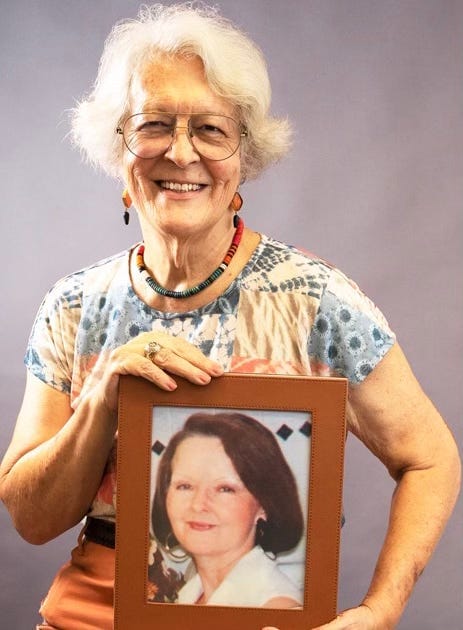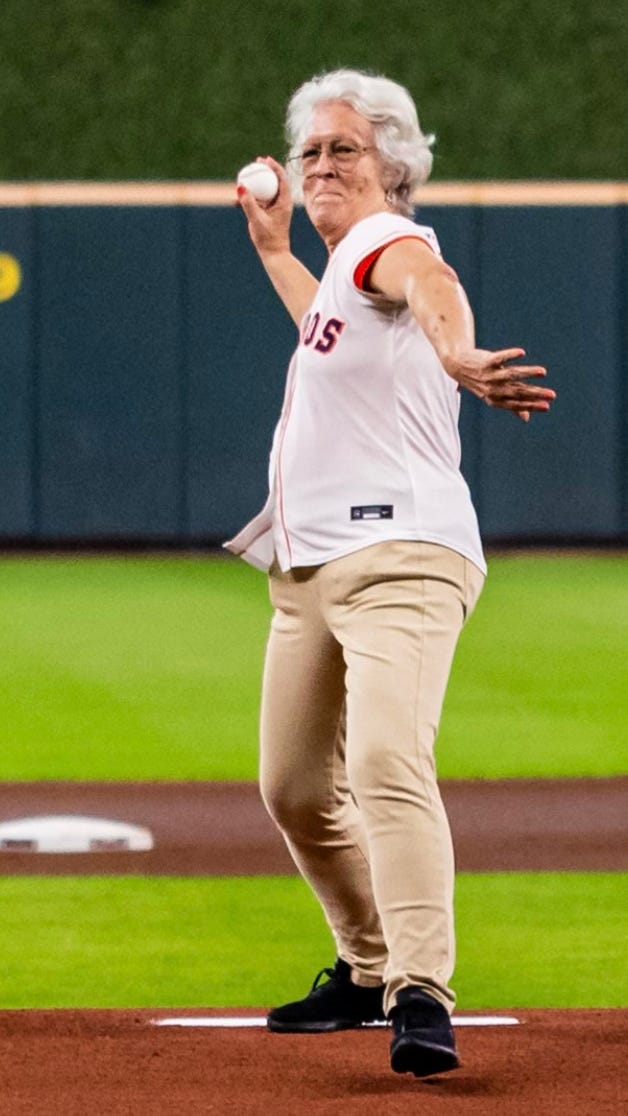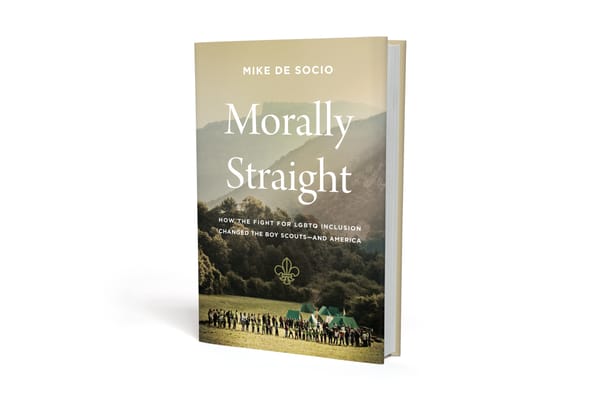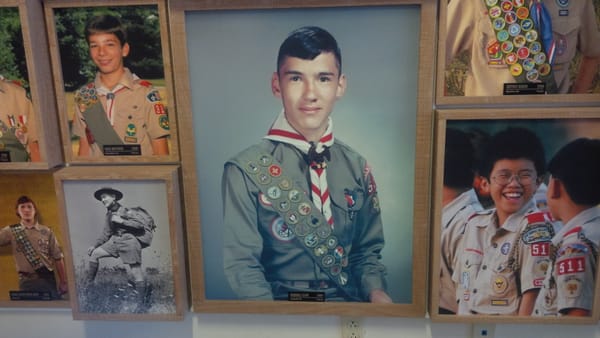Pride Profile: Phyllis Randolph Frye
The legendary transgender rights activist, and the country's first openly trans judge, excelled as an Eagle Scout — and used the Scout Law to guide the rest of her life.

Phyllis Randolph Frye joined Cub Scouts in the 1950s for much the same reason anybody else does: Her family was already heavily involved, and it seemed like something fun to do.
By the time she got her first Boy Scout handbook, she was all-in: Frye read it cover to cover, and quickly signed up for a Boy Scout troop at the Methodist church near her home in San Antonio, Texas. Buoyed by her brother, who was also working toward Eagle Scout, Frye shot up through the ranks. Around the time she earned her Star Scout rank, she was elected senior patrol leader of her troop.
“That was a real turning point in my life. I didn’t realize I was held in that high esteem by my peers, but I obviously was,” Frye told me.
Summer camp also became a highlight of Frye’s experience in Scouting, and is the source of many of her fondest memories. She still thinks about the one summer she tumbled to the ground from the top of a signal tower she had constructed but neglected to keep the lashings tight on. Or the last year she spent at summer camp with her troop’s senior patrol, passing most days out on the river working on her rowing merit badge.
But beneath the surface of all of this was something Frye wouldn’t dare share with anyone.
“Being trans and dealing with that as a youth — when I had no internet, I had no inkling what was going on — I was scared to death to admit to anybody that I would rather dress as a girl and be a girl, and I would rather be in the Girl Scouts than the Boy Scouts, and I would rather have been in the Brownies than the Cub Scouts. And in high school when I was R.O.T.C. commander, I would much rather have been a cheerleader,” she said. “Besides all that, Scouting was a thing to do every Tuesday night with friends, and it brought me recognition amongst my childhood friends, my parents and my family."
After earning her Eagle Scout rank, Frye mostly left Scouting to focus on high school, a place where she continued to excel. “I had a wonderful high school experience,” she said. She got good grades, served on the yearbook staff and a cappella choir, and most importantly for her family with strong ties to Texas A&M University, served as R.O.T.C. corps commander.
“My Scouting, and all that I learned in Scouting, had a lot to do with it,” Frye said of her high school success.
Scouting would also eventually become her roadmap for unlearning much of what she absorbed as a child in Texas in the 1960s.
“I grew up in San Antonio, and my family, my parents and my grandparents … they all taught me, either directly or through their conversation or comments or whatever, they taught me to be a racist and they taught me to see women as second class and they taught me to be anti-Jewish and anti-Catholic and anti-Hispanic and anti-Asian American — anti-everything except what we were. And what we were was white, heterosexual, male, middle class. And that’s what I was taught,” Frye said.
“You pick up the messages and you learn you’re not going to heap upon yourself more criticism, so you try to conform, so that's what I did for all of my life until I was about 24 years old,” she said.
Certainly her all-white Methodist scout troop did not directly counteract this programming — and indeed emphasized some of the homophobia and transphobia. But she later realized that Scouting didn’t contribute anything that wasn’t already clear from the culture at large.
“It had nothing to do with Scouting other than the fact that the precepts, going back to the Scout Law that I carried then and and I still carry even today, did not jive with the racism and the sexism and the antisemitism and all the other stuff that I was working through,” she said. In other words: Following the Scout Law helped Frye shed many of the -isms she learned from her family.
In fact, many years later, when the LGBTQ+ community was being attacked for its “lifestyle” and Scouting was arguing over gay membership, Frye penned an op-ed in the Houston Chronicle, where she used the 12 points of the Scout Law to inform the public what her trans “lifestyle” was really about: Being trustworthy, loyal, helpful, friendly, courteous, kind, obedient, cheerful, thrifty, brave, clean and reverent.
“I’m a very authoritative person, and I don’t put up with people’s shit,” Frye told me.
But beyond that article, Frye spend little time directly involved in Scouting’s debates over LGBTQ+ members. Instead, she kept plenty busy becoming one of the country’s leading transgender rights activists.
“I really had no time for taking on another fight,” she said.

In the 1970s, Frye publicly transitioned and started living full-time as a woman, a decision that cost her many family members, her career in engineering and a degree of personal safety (her home was egged, her tires slashed). Frye’s wife Trish stood by her through it all, and supported Frye as she struggled to find work and eventually pursued a law degree. (A 2020 obituary of Trish in the Houston Chronicle is a beautiful tribute to their relationship that’s well worth the read.)
As Frye began to establish herself as a lawyer in the 1980s and 90s, she also emerged as a formidable advocate for the transgender community, at a time when the larger gay rights movement saw trans folks as a liability. She began organizing a national transgender law conference; she helped plan the first National March on Washington for Lesbian and Gay Rights; she fought to repeal Houston’s law against cross-dressing; and she started lobbying in Washington with an activist group called “Transsexual Menace.” In her professional work, she was also “representing transgender clients in name-change and discrimination cases,” according to a New York Times profile of Frye.
This work came to define her life, and by the end of her law career (she just recently retired) she was representing trans clients exclusively. Frye, now 74, is still a judge in the municipal court in Houston — a post that made her the first openly trans judge in the nation.
She’s also dipping her toe back into the world of Scouting after all these years. Frye is a registered volunteer member of two linked troops in Houston, and plans to become a merit badge counselor.
At a recent court of honor Frye attended with her troop, most everyone there knew who she was and didn’t bat an eye — though a few adults seemed ill-at-ease with her presence. At the end of the night, two scouts, who Frye said were clearly gay, approached her to let her know how excited they were that she was there.
"When I was a scout, if I had had role models like Phyllis Frye, I would have just — oh, Hallelujah!” Frye said. “Of course that would have changed my life completely, and I wouldn't be who I am. And I wouldn’t want to change anything in my life, because I’m very satisfied with who I am and what I’ve done.”
Much of Frye’s life, and activism, is also captured in greater detail in this 2015 New York Times piece, which I encourage you to read. She is also the subject of a forthcoming biography, “Phyllis Frye and the Fight for Transgender Rights,” which you can pre-order here.


